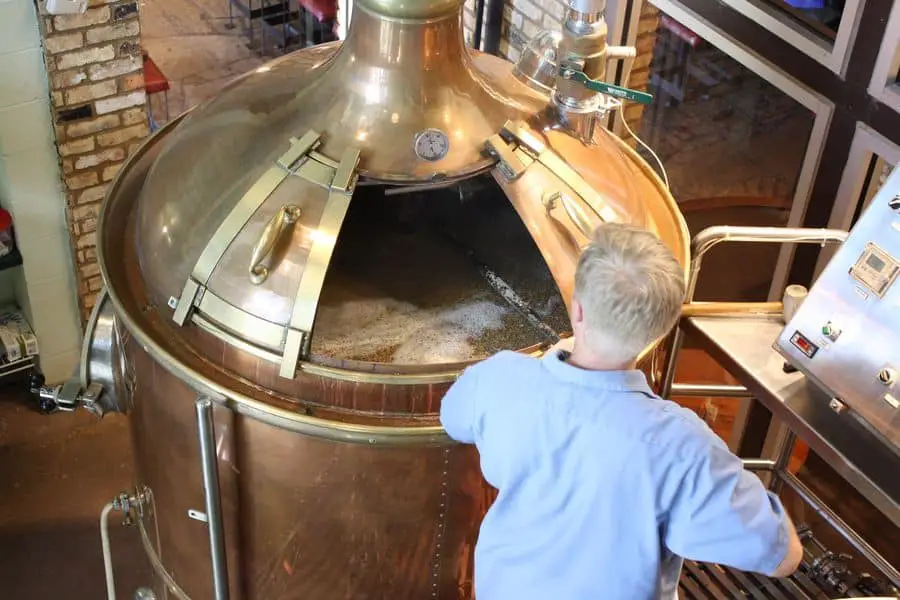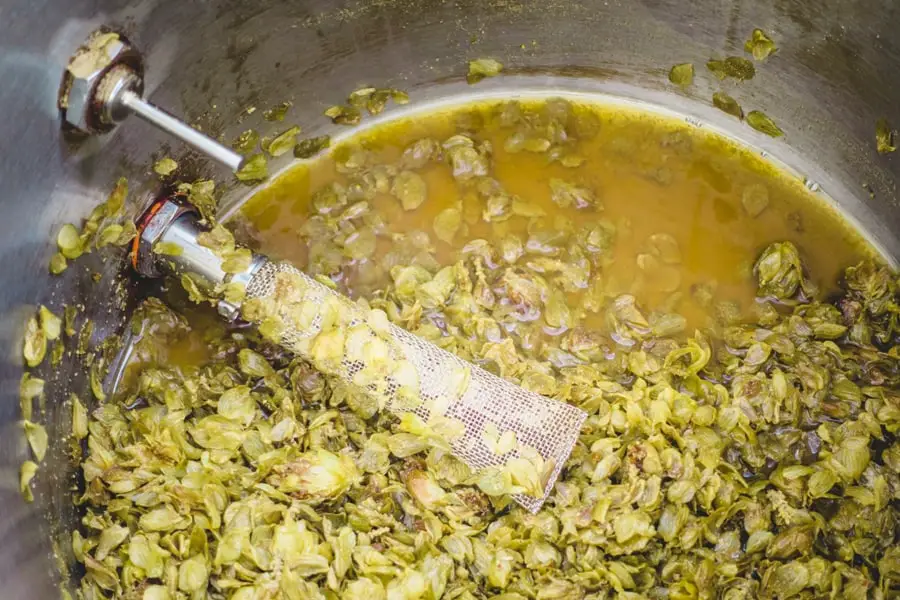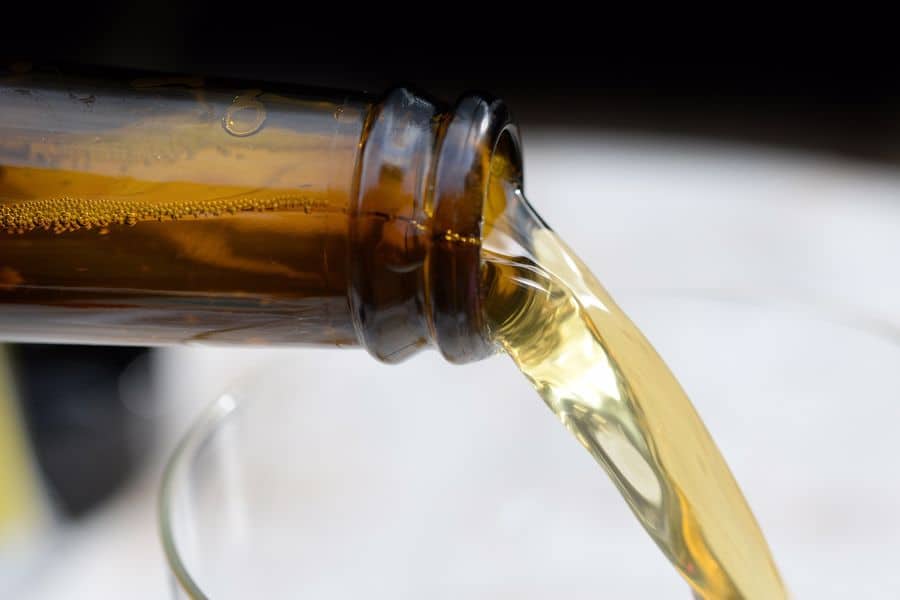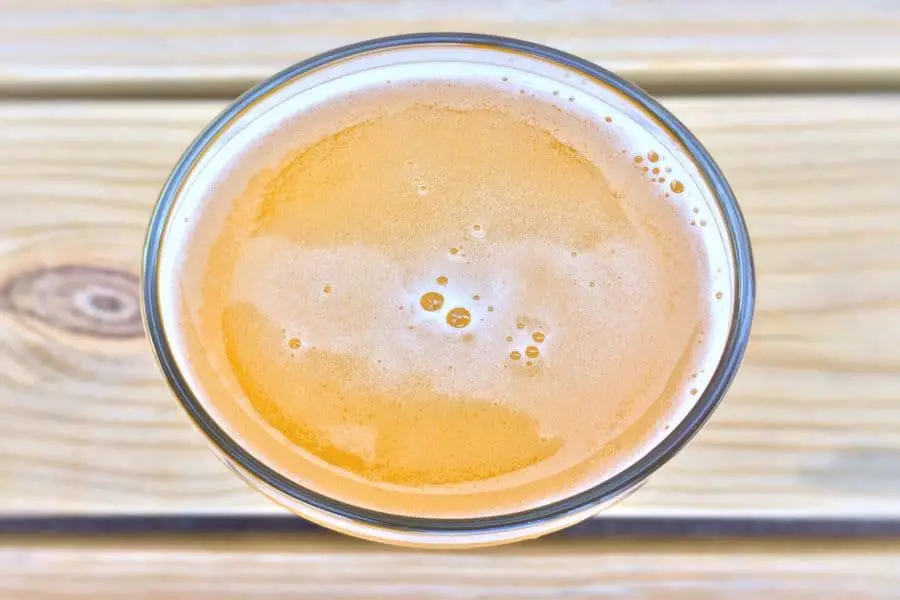If you buy something through a link in our posts, we may get a small share of the sale.
Filtration is when beer is cleared of any particles that may be in suspension and is a crucial step in brewing. Every brewer must know how to filter beer so that their product is consistent and of the highest quality possible to avoid hazy beer and off-flavors.
Contents
How to Filter Beer
Filtering your beer is one of the final steps in the brewing process and is crucial to ensuring a high-quality, consistent product. There are many different ways to filter beer, and it is a good idea if you experiment with different techniques to find what works best for you and your brewing setup.
No beer enthusiast will want to have a hazy beer down their throat, and if you are selling your beer, then you do not want customers to be turned off by its appearance. Filtration is the process of removing any particles that may be in suspension and is key to avoiding hazy beer.

Why Should You Filter Beer?
Filtration is the center of any brewing process. It is a crucial step that every brewer should know how to do. The following are some of the reasons why filtration is important:
- To ensure a consistent product: When you filter your beer, ensure that each batch is of the same quality. This is because filtering removes any particles that could potentially cause off-flavors or make the beer appear hazy.
- To improve the shelf life of your beer: If you are planning on selling your beer or storing it for a long time, filtering will help to improve its shelf life. This is because filtering removes any bacteria that could potentially cause the beer to spoil.
- To remove any off-flavors: If your beer has any off-flavors, filtration will help remove them. This is because off-flavors are often caused by particles that are in suspension.
- To make your beer look more appealing: Filtering your beer will make it appear clearer and more appealing to customers. This is because filtering removes any particles that could make the beer appear hazy and unappealing.
- To save time and money in the long run: Filtering your beer will save you time and money in the long run because it will improve the shelf life of your beer and make each batch more consistent.
Common Types of Beer Filters
There are many different types of beer filters, and each has its own benefits and drawbacks. Ideally, these filters work by removing any suspended particles in the beer. The following are some of the most common types of beer filters:
Diatomaceous Earth Filters
Diatomaceous earth filters are made from the fossils of diatoms, a type of algae. These filters are very effective at removing particles from beer, and they are often used in commercial brewing operations.
Diatomaceous earth filters have a very fine mesh that can remove particles as small as 0.5 microns, and that is why they are used in brewing.
Pros of Using These Filters
- Very effective at removing particles: These filters have a fine mesh that can remove particles as small as 0.5 microns. This ensures that your beer will be clear and free of any particles that could cause off-flavors or make the beer appear hazy.
- Can be used multiple times: Diatomaceous earth filters can be used multiple times, making them very economical and environmentally friendly.
- You can use it for hot and cold beer: This is the best part of this type of filter. It can be used for both hot and cold beer. So, if you want to filter your beer before it is carbonated or after it is carbonated, this filter will work great.
- It is readily available: You can find diatomaceous earth filters at most brewing supply stores or online. Ensure you get one from a recognized brand to avoid counterfeit filters.
Cons of Using Earth Filters
- The filter can get clogged easily: The filter can get clogged if there are too many particles in the beer. This can cause the beer to become hazy or have off-flavors.
- You need to backwash the filter: You will need to backwash the filter with hot water to clean it. This can be time-consuming, and you will need to be careful not to damage the filter.
Gravity Filters
Gravity filters are one of the most common filters used by homebrewers. They are very simple to use and very effective at removing particles from beer. Gravity filters work by allowing the beer to flow through a filter media, such as diatomaceous earth or charcoal.

Gravity filters are often used in conjunction with a pump to speed up the filtration process.
Pros of Using a Gravity Filter
- They are simple to use: Gravity filters are very simple to use. You need to pour the beer into the filter, and it will flow through the filter media.
- They are effective at removing particles: Gravity filters are effective at removing particles from beer. This is because the filter media, such as diatomaceous earth or charcoal, will remove any suspended particles in the beer.
- They are inexpensive: Gravity filters are very inexpensive and readily available. You can find them at most brewing supply stores or order online. Ensure you are dealing with a reputable brand to avoid any counterfeits.
Cons of Using Gravity Filters
- They can be slow: Gravity filters can be slow, depending on the size of the filter and the amount of beer you are trying to filter.
- They can be messy: Gravity filters can be messy, and you will need to be careful not to spill the beer.
Pump Filters
Pump filters are similar to gravity filters; however, they use a pump to speed up the filtration process. Pump filters are often used in commercial brewing operations because they are speedy and effective at removing particles from beer.
These filters work by pumping the beer through a filter media, such as diatomaceous earth or charcoal, to remove any particles that are suspended in the beer.
Pros of Using Pump Filters
- They are fast: Pump filters are very fast, and you can filter a large batch of beer in a short amount of time. That is why they are often used in commercial brewing operations.
- They are effective at removing particles and sediments: If you want to remove all the particles and sediments from your beer, pump filters are the best option and will give you the clearest beer possible.
Cons of Using Pump Filters
- They are expensive: Pump filters are more expensive than gravity filters. You will also need to purchase a pump to use with the filter.
Spun Filter
Spun filters are often used in commercial brewing operations because they effectively remove particles from beer. They work by spinning the beer at high speed, which causes the particles to be centrifuged out of the beer.
Spun filters are also known as clarifiers because they will make your beer clearer. The spun filters always block molecules that are larger than the pores in the filter media.
Pros of Using Spun Filters
- They are fast: Spun filters are very fast, and you can filter a large batch of beer in a short amount of time. That is why they are often used in commercial brewing operations.
- They are effective at removing particles: Spun filters are very effective at removing particles from beer because they spin the beer at high speed, which causes the particles to be centrifuged out of the beer.
- They make your beer clearer: Filtered beer often has a brighter appearance because of the centrifugal force used to remove particles from the beer and the fact that the filters block molecules larger than the pores in the filter media.
Cons of Using Spun Filters
- They are expensive: Spun filters are more expensive than gravity filters and pump filters. You will also need to purchase a centrifuge to use with the filter.

Wound Filter
Wound filters are made of a porous material that is wound around a central core. The most common type of wound filter is the cartridge filter.
Cartridge filters are made of pleated paper or fabric that is wrapped around a central core. Though they are not as strong as some other types of filters, they are very effective at removing sediment from beer.
To use a wound filter, simply place it in the filter housing and add beer to be filtered. The beer will flow through the filter and come out clear on the other side.
Ceramic Filters
Ceramic filters are the most common type of filter used in homebrewing. They come in various sizes, from 0.5 to 1 micron, and will remove most yeast and bacteria from your beer.
The main advantage of ceramic filters is that they are very easy to clean. You can simply rinse them with hot water, and they will be ready to use again.
The Filtration Processes Used in Beer Industry
Filtration is the focal point of the entire brewing process in the beer industry. Every beer that you have ever enjoyed has been filtered in some way, shape, or form. The type of filter used depends on the brewed style and the desired outcome.
Flavor, color, sterility, and clarity are all important factors when it comes to beer. Depending on the brewed style, different characteristics will be accentuated. For instance, IPAs are known for their hazy appearance, while Pilsners are known for their bright, clear look.
Incoming Water Filtration Process
The water filtration process is one of the most important steps in brewing beer. The quality of the water will directly impact the quality of the beer. All incoming water must be filtered to remove impurities that could affect the beer’s taste, smell, or appearance.
The following are some common types of water filters used in brewing:
- Granular Activated Carbon (GAC) Filters: GAC filters are used to remove chlorine from water. Chlorine can give the beer a bad taste and smell, so it is important to remove it before brewing.
- Reverse Osmosis (RO) Filters: RO filters are used to remove all impurities from water. This includes dissolved solids, minerals, and bacteria. RO water is often used in brewing beer because it gives the brewer complete control over the water quality.
- Deionization (DI) Filters: DI filters remove ions from water. Ions can give the beer a metallic taste, so it is important to remove them before brewing.
- Resin Exchange Filters: Resin exchange filters remove dissolved solids from water. This includes minerals, salts, and other impurities that can affect the taste of the beer.
Boiler Feed Water Filtration Process
The first step in the boiler feedwater filtration process is to remove any large particulate matter from the water. This can be done by passing the water through a coarse pre-filtration system, such as a screen filter or disc filter.
The next step is to remove any smaller particulate matter from the water. This is typically done with a multimedia filter, which uses a combination of sand, anthracite, and garnet to filter out particles as small as 20-30 microns.

The final step is to remove any dissolved solids from the water. This is done with an ion exchange system, which exchanges sodium ions for calcium and magnesium ions. This leaves the water with a neutral pH and reduces the risk of corrosion.
Centrifuge Seal Water Filtration Process
Sealing water helps to prevent leakage and contamination in centrifuges. The sealing water filtration process removes any particulate matter that could cause problems with the seals.
It also prevents the oxidation of the amino acids and carbohydrates in the beer. The sealing water filtration process is typically done with a 0.5-micron absolute filter. You can use a pleated filter or a cartridge filter for this process.
Post-Filtration Process
After the beer has been filtered, it is important to remove any residual impurities that could affect the beer’s taste, smell, or appearance. This is done with a post-filtration process.
The most common type of post-filtration is carbon filtration. Carbon filters remove any residual chlorine, dissolved solids, and other impurities that could affect the taste of the beer.
Steps in Filtering Your Beer
- Chill your beer: You don’t want to add heat to the equation when trying to filter your beer. Any heat will make your yeast more active and potentially screw up your final product. A mini kegerator can come in handy during this process.
- Create a slurry: To create a slurry, you will need something for the yeast to cling to. This can be anything from sterile Welsh coal to glass beads.
- Add your slurry to the beer: Slowly add your slurry to the beer while stirring. Be careful not to stir too vigorously, as you don’t want to add oxygen to the mix.
- Let it settle: Once you have added your slurry, let the mixture settle for a few hours, so the yeast has a chance to do its job.
- Filter the beer: After a few hours, it’s time to filter your beer. You can use anything from gravity filters to carbon filters.
- Enjoy your beer: Now that you have filtered your beer, it’s time to sit back and enjoy the fruits of your labor.
Related Questions
Can You Filter Beer Through a Coffee Filter?
No, you cannot filter beer through a coffee filter. Coffee filters are not designed to remove the yeast and bacteria from beer.
Can You Filter Beer Without a Filter?
Yes, you can filter beer without a filter; however, it will not be as effective. The best way to filter beer without a filter is to let it sit for a few weeks, so the yeast and bacteria have time to settle out.
Conclusion
Beer filtration is an important aspect and will definitely help your beer’s appearance and how long it can last. There are many ways to filter, each with its own set of pros and cons. Therefore, you need to decide what is best for your beer based on your goals, brewing process, and ingredients.

